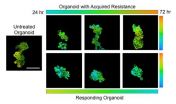(Press-News.org) WASHINGTON, D.C., October 28, 2014 – In the future, computers may be capable of talking to us during meetings just like a remote teleconference participant. But to help move this science-fiction-sounding goal a step closer to reality, it's first necessary to teach computers to recognize not only the words we use but also the myriad meanings, subtleties and attitudes they can convey.
During the 168th Meeting of the Acoustical Society of America (ASA), to be held October 27-31, 2014, at the Indianapolis Marriott Downtown Hotel, Valerie Freeman, a Ph.D. candidate in the Department of Linguistics at the University of Washington (UW), and colleagues will describe their National Science Foundation-sponsored work for the Automatic Tagging and Recognition of Stance (ATAROS) project. The project's goal is to train computers to recognize the various stances, opinions and attitudes that can be revealed by human speech.
"What is it about the way we talk that makes our attitude clear while speaking the words, but not necessarily when we type the same thing? How do people manage to send different messages while using the same words? These are the types of questions the ATAROS project seeks to answer," explained Freeman.
Identifying cues to "stance taking" in audio recordings of people talking is a good place to start searching for answers, according to Freeman and the principal investigators on the project, including Professors Gina-Anne Levow and Richard Wright in the Department of Linguistics, and Professor Mari Ostendorf in the Department of Electrical Engineering.
"In our recordings of pairs of people working together to complete different tasks, we've found they tend to talk faster, louder and with more exaggerated pitches when expressing strong opinions as opposed to weak opinions," Freeman said.
Not too surprising? Maybe not in terms of heated arguments, but the researchers found the same patterns within ordinary conversations, too. "People talk faster and say more at once when they're working on more engaging tasks such as balancing an imaginary budget as opposed to arranging items within an imaginary store," Freeman noted.
The researchers' also noticed that people also appear to be less fluent in the engaging tasks—displaying more false starts, cut-off words, "ums" and repetitions.
Further, it appears that "men might do this more than women—regardless of whether they're talking to another man or a woman." Freeman places a heavy emphasis on the word "might," because to date they've only explored this particular lack of fluency with 24 people.
So far, for the entire project, the researchers have worked with and recorded a total of 68 people of varying ages and backgrounds, all from the Pacific Northwest.
"We plan to continue to analyze these conversations for subtler cues and more complex patterns—variations in pronunciations when comparing positive and negative opinions, men vs. women, and older vs. younger people," said Freeman. "In the future, we hope to record people from other locations to see whether different regions have different ways of expressing the same opinions."
The lessons learned from this work should help enable sophisticated speech recognition systems of the future. "Think of all of the amazing things the computer on Star Trek can do," Freeman said. "To reach that level of sophistication, we need computers to understand all the subtle parts of a message—not just the words involved. Projects like ATAROS are working to help computers learn how to figure out what people really mean when they speak, so that in the future computers will be capable of responding in a much more 'human-like' manner."
Presentation #2pSC18, "Phonetic correlates of stance-taking," by Valerie Freeman, Richard Wright, Gina-Anne Levow, Yi Luan, Julian Chan, Trang Tran, Victoria Zayats, Maria Antoniak and Mari Ostendorf will be shown during a poster session on Tuesday, October 28, 2014, from 1:00 to 5:00 PM in Marriott 5. The abstract can be found by searching for the presentation number here: https://asa2014fall.abstractcentral.com/planner.jsp
INFORMATION:
ABOUT THE MEETING
The 168th Meeting of the Acoustical Society of America (ASA) will be held October 27-31, 2014, at the Indianapolis Marriott Downtown Hotel. It will feature more than 1,100 presentations on sound and its applications in physics, engineering, and medicine. Reporters are invited to cover the meeting remotely or attend in person for free.
PRESS REGISTRATION
We will grant free registration to credentialed journalists and professional freelance journalists. If you are a reporter and would like to attend, contact Jason Bardi (jbardi@aip.org, 240-535-4954), who can also help with setting up interviews and obtaining images, sound clips, or background information.
USEFUL LINKS
Main meeting website: http://acousticalsociety.org/content/fall-2014-meeting
Program and Abstracts: https://asa2014fall.abstractcentral.com/planner.jsp
Live Webcast Oct. 29: http://www.aipwebcasting.com/webcast/registration/oct2014.php
ASA's World Wide Press Room https://acoustics.org/?page_id=165
WORLD WIDE PRESS ROOM
ASA's World Wide Press Room is being updated with additional tips on dozens of newsworthy stories and with lay-language papers, which are 300-1,200 word summaries of presentations written by scientists for a general audience and accompanied by photos, audio, and video.
LIVE MEDIA WEBCAST
A press briefing featuring a selection of newsworthy research will be webcast live from the conference the afternoon of Wednesday, October 29. A separate announcement, which includes topics and times, will be sent later this week. Register at: http://www.aipwebcasting.com/webcast/registration/oct2014.php
ABOUT THE ACOUSTICAL SOCIETY OF AMERICA
The Acoustical Society of America (ASA) is the premier international scientific society in acoustics devoted to the science and technology of sound. Its 7,000 members worldwide represent a broad spectrum of the study of acoustics. ASA publications include The Journal of the Acoustical Society of America (the world's leading journal on acoustics), Acoustics Today magazine, books, and standards on acoustics. The society also holds two major scientific meetings each year. For more information about ASA, visit our website at http://www.acousticalsociety.org
One of the tragic realities of cancer is that the drugs used to treat it are highly toxic and their effectiveness varies unpredictably from patient to patient. However, a new "tumor-in-a-dish" technology is poised to change this reality by rapidly assessing how effective specific anti-cancer cocktails will be on an individual's cancer before chemotherapy begins.
A team of biomedical engineers at Vanderbilt University headed by Assistant Professor Melissa Skala has developed the technique, which uses fluorescence imaging to monitor the response of three-dimensional chunks ...
Tropical Cyclone Nilofar developed an eye on Oct. 28 that seemed to stare at NASA's Terra satellite as it passed overhead in space. Warnings are already in effect from the India Meteorological Department as Nilofar is forecast to make landfall in northwestern India.
On Oct. 28 at 06:50 UTC (2:50 a.m. EDT) the MODIS instrument aboard Terra captured a visible image of Tropical Cyclone Nilofar after it developed an eye while moving north in the Arabian Sea. The 12 nautical mile (13.8 miles/22.2 km) wide eye was surrounded by powerful thunderstorms and bands of thunderstorms ...
DEET has been the gold standard of insect repellents for more than six decades, and now researchers led by a University of California, Davis, scientist have discovered the exact odorant receptor that repels them.
They also have identified a plant defensive compound that might mimic DEET, a discovery that could pave the way for better and more affordable insect repellents. Findings from the study appear in the journal Proceedings of the National Academy of Sciences.
More than 200 million people worldwide use DEET, developed by scientists at the U.S. Department of Agriculture ...
Nitrogen is an essential component of all living systems, playing important roles in everything from proteins and nucleic acids to vitamins. It is the most abundant element in Earth's atmosphere and is literally all around us, but in its gaseous state, N2,, it is inert and useless to most organisms. Something has to convert, or "fix," that nitrogen into a metabolically usable form, such as ammonia. Until about 100 years ago when an industrial-scale technique called the Haber-Bosch process was developed, bacteria were almost wholly responsible for all nitrogen fixation on ...
Boulder, Colo., USA - Mountain glaciers represent one of the largest repositories of fresh water in alpine regions. However, little is known about the processes by which water moves through these systems. In this study published in Geology on 24 Oct. 2014, David S. Heeszel and colleagues use seismic recordings collected near Lake Gornersee in the Swiss Alps to look for signs of water moving through fractures near the glacier bed. Analysis of these recordings reveals, for the first time, that harmonic tremor occurs within mountain glaciers and that individual icequakes at ...
BEER-SHEVA, Israel, October 28, 2014... A lack of sufficient punishment for deception facilitates "flopping" in basketball, according to new research from Ben-Gurion University of the Negev (BGU), which revealed that two-thirds of the falls were found to be intentional. Based on the research, the authors believe that players and teams are unaware of the cost/benefit analysis of "flopping" or the negative effect of falling if no offensive foul is awarded, which is indeed the case 90 percent of the time.
In the study, published recently in the Journal of Economic Behavior ...
Farmland is vanishing in part because the salinity in the soil is rising as a result of climate change and other man-made phenomena. In an Opinion piece publishing in the Cell Press journal Trends in Plant Sciences, researchers propose a new concept for breeding salt- tolerant plants as a way to contribute to global efforts for sustainable food production.
"We suggest that we should learn from nature and do what halophytes, or naturally salt-loving plants, are doing: taking up salt but depositing it in a safe place—external balloon-like structures called salt bladders," ...
A large analysis of over 40,000 individuals on statin treatment has identified two new genetic variants which influence how 'bad' cholesterol levels respond to statin therapy.
Statins are widely prescribed to patients and have been shown to lower bad cholesterol levels by up to 55%, making them a highly effective method of reducing risk of heart disease. However, despite this success, patient response can vary widely.
The study, led by Queen Mary University of London and published in Nature Communications, is the largest to date and involved analysing data from six ...
We're more likely to punish wrongdoing as a third party to a non-violent offense than when we're victimized by it, according to a new study by New York University psychology researchers. The findings, which appear in the journal Nature Communications, may offer insights into how juries differ from plaintiffs in seeking to restore justice.
Their study, conducted in the laboratory of NYU Professor Elizabeth Phelps, also shows that victims, rather than seeking to punish an offender, instead seek to restore what they've lost.
"In our legal system, individuals are presented ...
HOUSTON – (Oct. 28, 2014) – A Japanese mushroom extract appears to be effective for the eradication of human papillomavirus (HPV), according to a pilot clinical trial at The University of Texas Health Science Center at Houston (UTHealth) Medical School.
The results were presented at the 11th International Conference of the Society for Integrative Oncology in Houston today by principal investigator Judith A. Smith, Pharm.D., associate professor in the Department of Obstetrics, Gynecology and Reproductive Sciences at the UTHealth Medical School.
Ten HPV-positive ...


